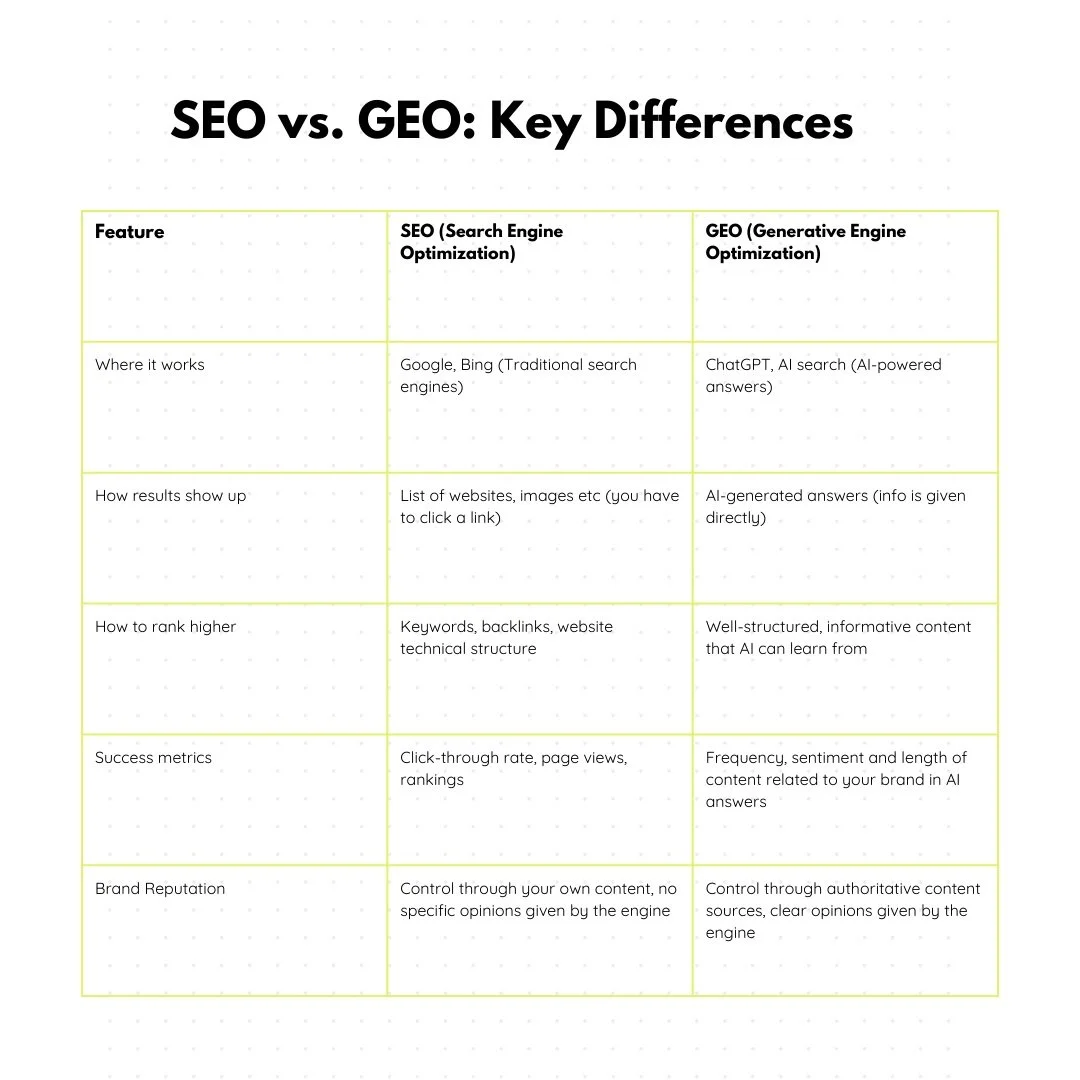GEO vs. SEO: What’s the Difference and Why It Matters for Your Business?
Ever searched for something and noticed that Google and AI chatbots give answers in different ways? That’s because they have two different ways of answering queries: in simplest terms, Search Engines determine your relevance through backlinks, while Generative Engines determine it though citations.
SEO (Search Engine Optimization) and GEO (Generative Engine Optimization) are therefore two entirely different disciplines.
So, what’s the difference, and how do they affect your business? Let’s break it down in a way that’s easy to understand!
What is SEO?
SEO is how businesses get their website to rank higher on Google or Bing. When people search for things like:
✔ Most reliable SUV
✔ What is the best skin care line?
✔ Latest fashion trends for bags
Google indexes millions of websites and shows a list of links based on a number of factors including relevance, speed, and quality. Key parts to control are:
- Keywords (words people search for)
- Backlinks (links from trusted sources)
- Easily crawlable content (findable, technically structured, quick to load, etc.)
SEO is important for getting website traffic, but it takes time, competition is high, and users are migrating to AI-aided research.
What is GEO?
GEO is the new way businesses get found in AI-powered Generative Engines like:
- ChatGPT
- Google’s Gemini
- Perplexity
- Meta’s Llama
Instead of listing websites, these AI tools generate an instant answer by pulling information from many sources. For example:
"Most reliable SUV?"
AI might combine expert reviews, safety ratings, and customer feedback to give a full answer—without making you click through to a website.
"What is the best skin care line?"
Instead of showing blogs and brand websites, AI analyzes thousands of reviews, research papers, and articles and recommends top-rated skincare brands instantly.
"Latest fashion trends for bags?"
AI summarizes influencer picks, fashion magazine insights, and shopping trends into one response.
With GEO, businesses need to format their content in a way that AI tools can easily find and use.
Why GEO Matters Now
✔ AI-powered search is growing FAST—ChatGPT already gets over 10 million daily searches.
✔ Google’s AI Search is changing how people find info—less clicking, more instant answers.
✔ Businesses that don’t adapt to GEO will lose visibility as AI-generated results take over.
💬 Expert Opinion:
“It’s time to rethink our approach—AI-first, not human-first. We need to undo traditional business processes and rebuild with AI at the core. Organizations that embrace AI-first thinking will thrive. Those that don’t? They risk falling behind.” ”
Based on the research by Gartner, by 2026, traditional search engine volume will drop 25%.
““Generative AI(GenAI) solutions are becoming substitute answer engines, replacing user queries that previously may have been executed in traditional search engines. This will force companies to rethink their marketing channels strategy as GenAI becomes more embedded across all aspects of the enterprise.”
”
What Should You Do?
✔ Don’t ignore SEO—Google searches still matter!
✔ Establish a new GEO strategy — understand what you need to influence vs your competitors, and where it is needed.
✔ Create high-quality, well-structured content—AI tools pick up clear, reliable, and factual information.
✔ Work with experts—reegen.ai specializes in GEO optimization to help businesses stay ahead.
Final Thoughts
SEO helps you rank on Google.
GEO helps ChatGPT find and use your content.
To win online in 2025, businesses need to optimize differently for BOTH. If you’re not sure where to start, reegen.aican help!
Have any questions? Just ask—just like you would in ChatGPT!

